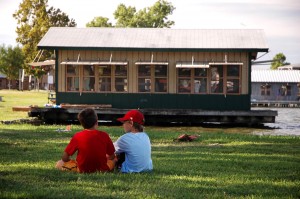Resilience and Contentment
June 24, 2013
 When talking with our camp parents, I often talk about the many ways that children grow at camp; discovering themselves while away from their parents’ shadows. I love the chance for campers to challenge themselves and feel the excitement of triumph. I also love watching them learn to cope with disappointment and even failure, because this will teach them to deal with adversity later in life.
When talking with our camp parents, I often talk about the many ways that children grow at camp; discovering themselves while away from their parents’ shadows. I love the chance for campers to challenge themselves and feel the excitement of triumph. I also love watching them learn to cope with disappointment and even failure, because this will teach them to deal with adversity later in life.
During one such conversation with one of my favorite camp moms, she shared this story.
Her son had decided to clean his room (a shock in and of itself) and he had come to his trophies and ribbons. His mom arrived to see that he had created two piles: one large and one small.
“What are the different piles?”
Pointing to the small pile, he said, “those are the awards from the tournaments and meets that I won.” He then dismissively pointed at the larger pile, “those are the ones I got just for showing up. I am throwing them away.”
When she shared this with me, I pictured all the well-meaning organizers and coaches who had arranged unearned awards for his entire life in an effort to give him greater self-esteem. Clearly, it did not fool him.
The self-esteem movement has done an entire generation a deep disservice. It started with the best intentions. In 1969, Nathaniel Brandon wrote a paper entitled “The Psychology of Self-Esteem” that suggested that “feelings of self-esteem were the key to success in life”. Hearing this, many people started to find ways to confer confidence upon our children. This resulted in competitions where everyone gets a trophy and no one actually wins. “New games” attempted to engage children without any winners or losers.
The parents who embraced these efforts did so out of love and with the most noble of intentions. The only problem is that these efforts simply do not work. Self-esteem is not something conferred, it is earned through taking risks and developing skills. When children stretch themselves, they expand their sense of their own capability and then feel confident to tackle the next challenge. Confidence comes form competence - we do not bestow it as a gift.
Relatedly, we also spend too much time protecting our children from any pain or adversity. We hate to see them struggle and we suffer when they suffer. But the same loving envelope that protects them from pain also protects them from growth.
In her book “Blessing of a Skinned Knee”, Dr Wendy Mogel suggests that children insulated from unpleasant situations or challenges become less capable to deal with adversity. She notes that college deans are seeing a growth in incoming “teacups”: students so overprotected by their parents that there are effectively incapable of functioning in the new (and parentless) world of higher education. They encounter adversity and “chip like a teacup”.
Harvard Psychiatrist Dr. Dan Kindlon writes in “Too Much of a Good Thing” that parents often focus on making sure their children avoid pain and disappointment. As a result, they often fight their children’s battles for them and insulate them from difficult experiences. In his private practice, he observes that these children feel less capable and are more likely to struggle in relationships and with challenges. They also can feel guilty when they are not feeling happy.
By protecting our children, we do them a double disservice. First, we insulate them from experiences that can facilitate growth and resilience. Second, by actively protecting them, we send them the message that they are not capable of coping on their own.
I think much of this problem comes from the having the wrong goal of parenting. If we see ourselves primarily as protectors and facilitators, we see challenges as potential sources of discomfort.
Instead, we should see ourselves as preparing our children to be independent, confident and capable. We should protect less and instead seek out experiences that will develop their resilience and optimism. Here, I define optimism as the belief that an individual’s actions can affect his or her circumstances and that difficult situations are temporary.
We must prepare our children for a world that is often unpredictable and even inhospitable - that is the gift of resilience.
We must also provide them with a philosophical framework that enables them to understand that even if everything is not ideal, life is still worth embracing with joy and excitement - that is the gift of optimism.
In order to do this, we need to allow them to struggle and strive without us. We must also allow them to occasionally fail. It is not fun, but it could be the greatest gift we provide them.
To quote Dr Mogel one final time, it is our job to prepare our children for the road, not prepare the road for our children.
Steve Sir
